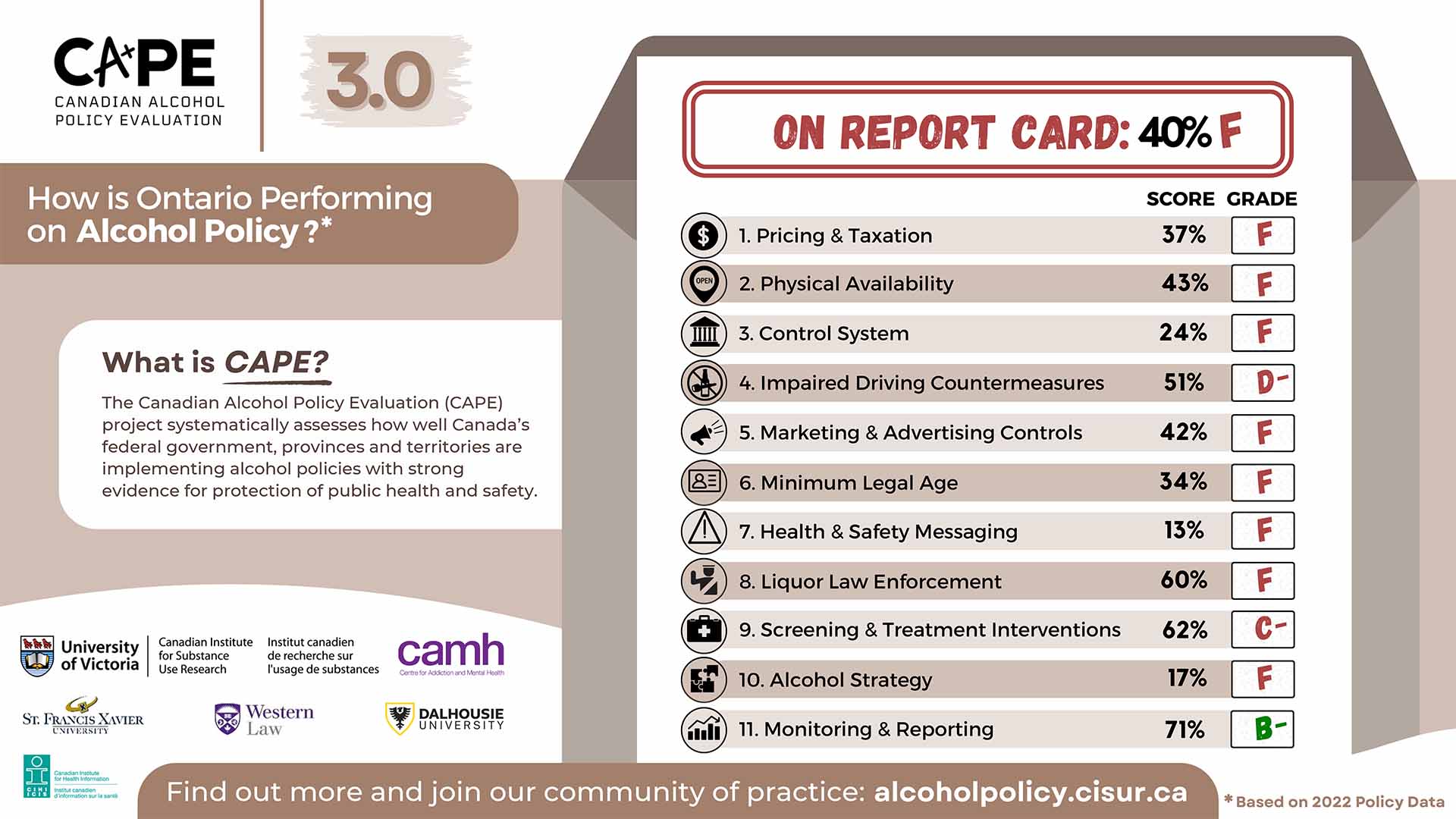TORONTO, May 17, 2023 – The Canadian Alcohol Policy Evaluation (CAPE) Project, released today its third and latest report evaluating alcohol control policies nationwide and in all 13 provinces and territories. Ontario scored a failing grade of 40 per cent, down from 55 per cent in 2019.
“Over the last several years, reductions in minimum alcohol pricing, extended hours of sale and expanded alcohol availability through take-out and delivery have all made alcohol more accessible both financially and physically, resulting in higher consumption, and ultimately more hospitalizations and alcohol-related deaths,” says Dr. Kevin Shield, Independent Scientist, CAMH Institute for Mental Health Policy Research.
“The Ontario provincial government is currently considering the sale of alcohol in convenience stores, which would be absolutely a move in the wrong direction,” says Dr. Leslie Buckley, Chief of the Addictions Division at CAMH. “We know that with the expansion of private outlets come increased alcohol consumption as well as healthcare costs and overall community harm. We’ve seen these harms play out elsewhere in Canada, notably in Alberta and British Columbia.”
“The good news for Ontario is that there’s a clear roadmap for us to do better,” adds Ashley Wettlaufer, CAMH Research Methods Specialist responsible for CAPE data collection, validation and analysis. “The recommended policies—such as refraining from further privatization and increasing minimum pricing—are achievable for Ontario, as most of them are already implemented somewhere in Canada. If we enacted all the current best practices that have been implemented across the provinces and territories we’d double our overall score and achieve an ‘A-’ or 80 per cent. Most importantly, it will result in less harm for Ontarians.”
The Ontario CAPE Project evaluation includes a detailed report card for our province which shows how we are faring in 11 different policy domains (including pricing and taxation, physical availability, control system, marketing and advertising, health and safety messaging and more) and offers tailored recommendations for how we can improve our scores and strengthen our policies in support of public health.
The CAPE Project is led by the University of Victoria’s Canadian Institute for Substance Use Research (CISUR) and brought together researchers from institutions across Canada to evaluate alcohol control policies and provide evidence-based solutions to improve health and wellbeing. The first CAPE report released in 2013 was led by CAMH and a team of 16 researchers. The second report was released in 2019 and led by the University of Victoria and CAMH.
Overall the results for Canada’s provincial, territorial and federal governments are quite poor. Every single jurisdiction got an overall failing grade, with the lowest scoring jurisdiction, Northwest Territories, only getting 32 per cent. The highest scoring jurisdictions—Manitoba and Quebec—only scored 44 per cent and 42 per cent, respectively. The federal government’s score was just 37 per cent.
The CAPE Project is a collaborative project involving researchers from CAMH, Western University, St Francis Xavier University, Dalhousie University, and the Canadian Institute for Health Information. All these institutions worked together to create the evidence-based scoring rubric, collect relevant policy data from across the country, and score the individual provincial, territorial and federal governments on how they fared across the 11 different policy domains. The project also relied on stakeholders within government to validate the data and ensure its accuracy.
The CAPE Project was funded by Health Canada and the Public Health Agency of Canada.
For full recommendations of evidence-informed principles to guide public alcohol policy in Ontario, review the CAMH Alcohol Policy Framework.
ABOUT THE CENTRE FOR ADDICTION AND MENTAL HEALTH (CAMH)
CAMH is Canada's largest mental health and addiction teaching hospital and a world-leading research centre in this field. CAMH combines clinical care, research, education, policy development and health promotion to help transform the lives of people affected by mental illness and addiction. CAMH is fully affiliated with the University of Toronto, and is a Pan American Health Organization/World Health Organization Collaborating Centre. For more information, please visit camh.ca or follow @CAMHnews on Twitter.
-30-
Media Contacts:
Ontario CAPE data:
Hayley Clark (CAMH Manager, Media Strategy) at [email protected]
National CAPE data:
Amanda Farrell-Low (Communications Officer, CISUR) at 250-472-5445 or [email protected]
Click here to view the CAPE Ontario Report Card


